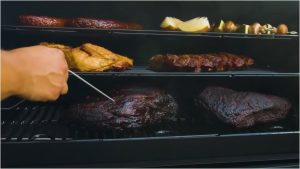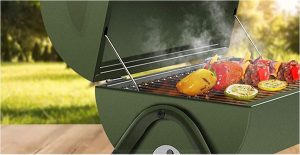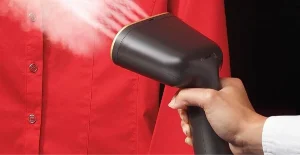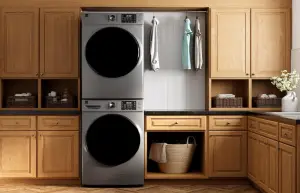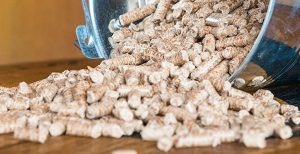Why Use a Wooden Spoon Instead of a Metal Spoon
Note: This article may contain affiliate links, which means if you make a purchase following our links won’t cost you extra, but we may earn a commission. Learn more
For those wondering why to use a wooden spoon instead of a metal spoon, there are several compelling reasons. Wooden spoons are gentle on cookware, minimizing the risk of scratching or damaging delicate surfaces like non-stick pans. They do not conduct heat as efficiently as metal spoons, reducing the likelihood of burns while stirring hot dishes.
In the realm of cooking, wooden spoons have a multitude of uses. They are commonly employed for stirring, mixing, and scraping ingredients. To baking, wooden spoons shine, as their gentle nature helps maintain the desired texture of batters and doughs without overmixing. They are particularly adept at folding ingredients together, preserving the lightness of delicate recipes such as soufflés or meringues.
Wooden spoons come in various types, each tailored to specific tasks. Slotted wooden spoons are perfect for straining liquids or lifting solid ingredients from pots, while flat-edged spoons excel at scraping the bottom of pans to prevent food from sticking.
While wooden spoons offer numerous benefits, acknowledge their disadvantages. They can absorb flavors and odors from certain ingredients, potentially impacting the taste of future dishes. Regular cleaning and oiling can help mitigate this issue. Also, proper maintenance is necessary to prevent drying out and cracking.
In terms of hygiene, wooden spoons are generally considered safe to use. The natural antimicrobial properties of wood inhibit the growth of bacteria. However, thorough cleaning after each use is essential to prevent potential contamination.
Wooden spoons are typically crafted from hardwoods like beech, maple, or olive wood, known for their durability and resistance to moisture. These materials ensure that the spoon remains sturdy and long-lasting with proper care.
Related: 6 Best Wooden Turners for Safe and Effective Cooking
Are Wooden Spoons Good for Cooking?
Wooden spoons have been a staple in kitchens for centuries and for good reason. They are not only aesthetically pleasing but also highly functional when it comes to cooking. Wooden spoons are a versatile tool that can be used for a variety of cooking tasks, making them an essential item in any kitchen.
One of the main reasons why wooden spoons are good for cooking is their gentle nature. Unlike metal spoons, wooden spoons are less likely to scratch or damage the surface of your cookware, whether it’s a non-stick pan or a delicate pot. This makes them ideal for stirring, mixing, and scraping without causing any harm.
Wooden spoons are also great at distributing heat evenly. The natural insulating properties of wood prevent the spoon from getting too hot, allowing you to comfortably handle it even when stirring hot liquids or sauces. This is particularly beneficial when working with delicate ingredients that require precise temperature control.
Furthermore, wooden spoons are non-reactive, meaning they won’t react with acidic or alkaline ingredients. This is especially important when cooking dishes that contain tomatoes, citrus fruits, or vinegar, as metal utensils can sometimes impart a metallic taste to the food. With a wooden spoon, you can rest assured that the flavors of your dishes will remain pure and unaffected.
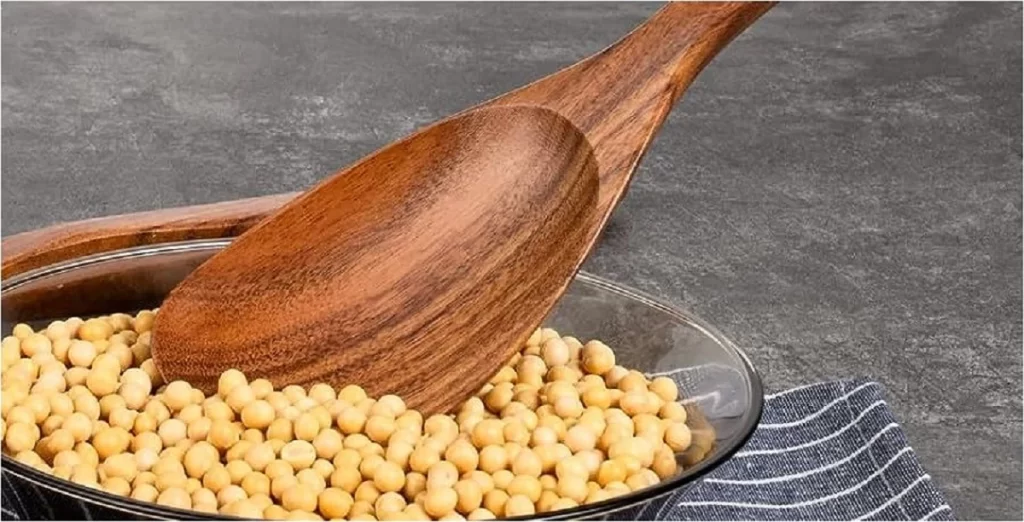
What Do You Use a Wooden Spoon For?
Mixing and Stirring
Whether you’re making a thick soup, a creamy sauce, or a cake batter, a wooden spoon is perfect for mixing and stirring. Its long handle and wide, flat head allow you to reach the bottom of the pot or bowl, ensuring that all the ingredients are thoroughly combined.
Scraping
The flat edge of a wooden spoon is great for scraping the bottom of pans or bowls, making sure you get every last bit of sauce or batter. It’s particularly useful when making caramel or sauces that tend to stick to the bottom of the pan.
Tasting
Wooden spoons are safe to use for tasting hot liquids or sauces. Unlike metal spoons, they won’t conduct heat, so you can confidently dip a wooden spoon into a simmering pot to check the seasoning or flavor of your dish.
Folding
When you need to gently incorporate ingredients into a delicate mixture, such as folding egg whites into a cake batter, a wooden spoon is the perfect tool. Its soft edges won’t deflate the mixture, allowing you to maintain the desired texture and consistency.
Serving
Wooden spoons can also be used for serving dishes, especially when you want to avoid scratching or damaging your servingware. They are particularly handy for serving rice, pasta, or other dishes that require gentle handling.
Read More: 6 Best Insulated Food Containers to Keep Food Hot
Why Use a Wooden Spoon Instead of a Metal Spoon?
Gentle on Cookware: One of the main advantages of using a wooden spoon is that it is gentle on your cookware. Unlike metal spoons, wooden spoons are less likely to scratch or damage the surface of your pots and pans, especially those with non-stick coatings. This helps to prolong the lifespan of your cookware and ensures that it remains in good condition.
Non-Reactive: Wooden spoons are non-reactive, meaning they won’t react with acidic or alkaline ingredients. This is particularly important when working with ingredients like tomatoes, citrus fruits, or vinegar, as metal spoons can sometimes impart a metallic taste to the food. With a wooden spoon, you can be confident that the flavors of your dishes will remain pure and unaffected.
Heat Resistant: The best wooden spoons are excellent at resisting heat. The natural insulating properties of wood prevent the spoon from getting too hot, even when stirring hot liquids or sauces. This makes them comfortable to handle and reduces the risk of burns. In contrast, metal spoons can become scorching hot and may require the use of oven mitts or pot holders.
Versatility: Wooden spoons are versatile kitchen tools that can be used for a variety of cooking tasks. They are great for stirring, mixing, scraping, and even serving. Their long handles and wide, flat heads make them ideal for reaching the bottom of pots and bowls, ensuring that all the ingredients are thoroughly combined.
Aesthetically Pleasing: Let’s not forget the aesthetic appeal of wooden spoons. They add a touch of warmth and natural beauty to your kitchen, elevating the overall ambiance. Whether displayed in a utensil holder or hanging on a hook, wooden spoons can be a stylish addition to your culinary space.
Our Choice on Amazon: Wooden Spoons for Cooking
What’s Wrong with Wooden Spoons?
While wooden spoons are widely used and loved by many home cooks, there are a few potential drawbacks to consider. Be aware of these factors to make an informed decision about whether or not to use wooden spoons in your kitchen. Here are some of the potential issues associated with wooden spoons:
Absorbency
Wood is a porous material, which means that wooden spoons have the potential to absorb liquids, flavors, and odors. This can be a concern when working with strong-smelling ingredients or when using the spoon for different tasks without washing it in between.
Staining
Wooden spoons can become stained over time, especially when used with ingredients like turmeric, tomato-based sauces, or food coloring. While this doesn’t affect the functionality of the spoon, it may impact its appearance.
Durability
Compared to metal or silicone utensils, wooden spoons may not be as durable. Over time, they can develop cracks, and splinters, or become worn down. However, with proper care and maintenance, such as hand washing and occasional oiling, wooden spoons can last for a long time.
Hygiene
Some people may have concerns about the hygiene of wooden spoons, as wood is a natural material that can harbor bacteria. Studies have shown that wooden utensils possess natural antimicrobial properties, making them as safe and hygienic as other types of utensils. Regular cleaning and proper drying are essential to maintain their cleanliness.
Not Suitable for High Heat
Wooden spoons are not recommended for use in high-temperature cooking, such as deep-frying or searing. The wood can char or burn when exposed to excessive heat, compromising the integrity of the spoon. It’s best to use heat-resistant utensils, such as metal or silicone, for these types of cooking methods.
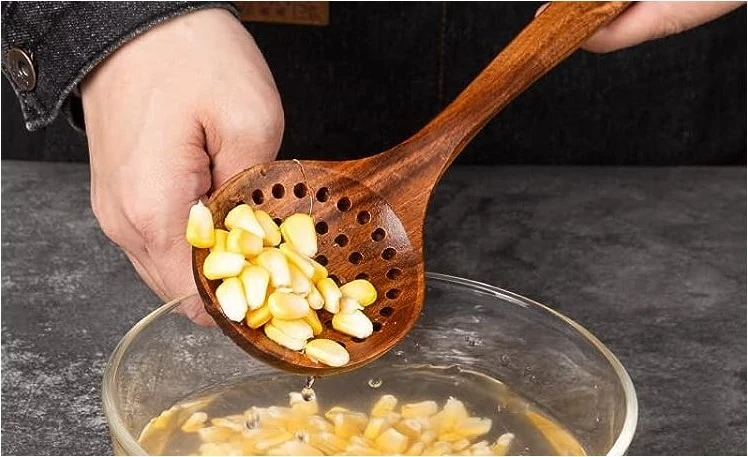
Are Wooden Spoons Safe for Non-Stick Pans?
Wooden spoons are a great option for non-stick pans because they are gentle on the surface and won’t scratch or scrape off the non-stick coating. Also, the best wooden spoons are heat-resistant, which means they won’t melt or warp when used with high heat.
This makes them a safe and reliable choice for cooking in non-stick pans. Wooden spoons can absorb flavors and odors from certain ingredients, such as garlic or onions. This can affect the taste of future dishes, so it is important to properly clean and maintain the spoon.
Another advantage of using wooden spoons with non-stick pans is that they are lightweight and easy to handle, providing a comfortable grip for precise control while cooking.


